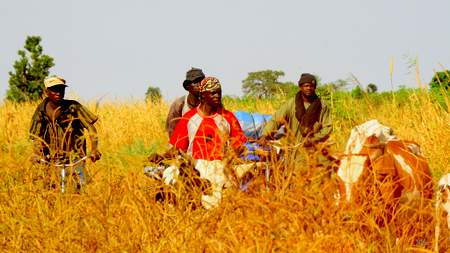
Cattle herders in Mali
If we look into Africa‘s recent history, we see that this part of the world fits perfectly, at this time, into the growth limits stated by Reverend Thomas Malthus more than 200 years ago. With a population doubling every 25 years and an ecological decline hard to slow down, Africa is about to reach its “limits of growth”. But this is not a reason to despair.
At the Forum for Agricultural Research in Africa Science Week that will take place in Accra, Ghana between July 15-20th, ensuring food security will be the hottest topic on agenda. With a diverse audience made up of policy makers, researchers, private sector and civil society representative, the Science Week will try to establish how agriculture can transform Africa’s future.
A new economic vision for Africa’s future has to be set in order to regulate the agricultural sector and to allow agricultural research to give aid at all levels of society. Agricultural innovation can help define new solutions in light of emerging challenges such as climate change in a time when the World Bank states that a 20C growth in global temperature might lead to a 4-5% permanent decrease in the annual income per capita in Africa. While leaders try to solve problems, their prevention requires an appreciation of emerging challenges and how they might influence current and future economic strategies. Such a shift in view, towards a more foresight oriented policy making process in which innovation is an integral part of, should focus on Africa as a learning society (as stated by Calestous Juma).
Africa should no longer see itself as a group of nations entrenched in its traditional agricultural practices, but as a homogenous region willing to learn and ready to push the limits of knowledge and growth. Following the examples of Morocco that 5 years ago moved towards replacing its staple crops with high value crops (moving from cereal crops to citrus fruits and tomatoes) in order to accelerate GDP growth and to raise farmers’ incomes of Ethiopia who decided in the 1990s to invest in sesame and cut flowers, African countries can succeed if they work together. Governments, together with the agricultural research sector, can provide the conceptual policy frameworks that will constitute the building blocks for Africa’s transformation.
By renewing its infrastructure, developing the research and development sector, building on the human capabilities and working in and with the global economy, African leaders can make a shift from reaching limits to breaking them.
Until the FARA Africa Agriculture Science Week kick starts on July 15th, I leave you with one thing on your mind: what do you think that Africa should do in order to ensure its food security? Increase its agricultural productivity? Invest in youth as future farmers? Better support the private sector? What would be your solution?
Blog by Codrin Paveliuc-Olariu, one of the AASW social reporters
Picture courtesy Peter Casier/CCAFS–CGIAR
Africa need to invest in youths as they are agents of change in development of Africa through agriculture.
Africa needs to unlock the potentials in African youth in order to become a power house in agriculture.
Youth are the good manger for the future of Africa. so Africa should invest in farming agriculture and build public-private partnership to ensure sustainability of their food policy.
The African youth is the engine for agricultural transformation on the continent
Africa must enhance capabilities and ensure that youth take over. They are more receptive to innovations and would be able to manage the transformations that today’s agriculture require.
The private sector can also play a pivotal role (“rôle de levier”) in the transformation of agriculture both in the diffusion of innovative techniques or the provision of services. Although still practiced in a small scale, contract farming (“agriculture contractuelle”) has helped to change farmers practices in Madagascar.
Investing in research and technology will tranform the agricultural sector. It will also help to develop crops that are resistant to extreme conditions.
Pingback: Opening Young Minds to Africa’s Agriculture – How the 6th AASW connects the dots | LEARN SHARE CHANGE
Reblogged this on Nawsheen Hosenally.
Pingback: Africa’s agricultural transformation starts today | LEARN SHARE CHANGE
Reblogged this on The Agro-Youth Centre.